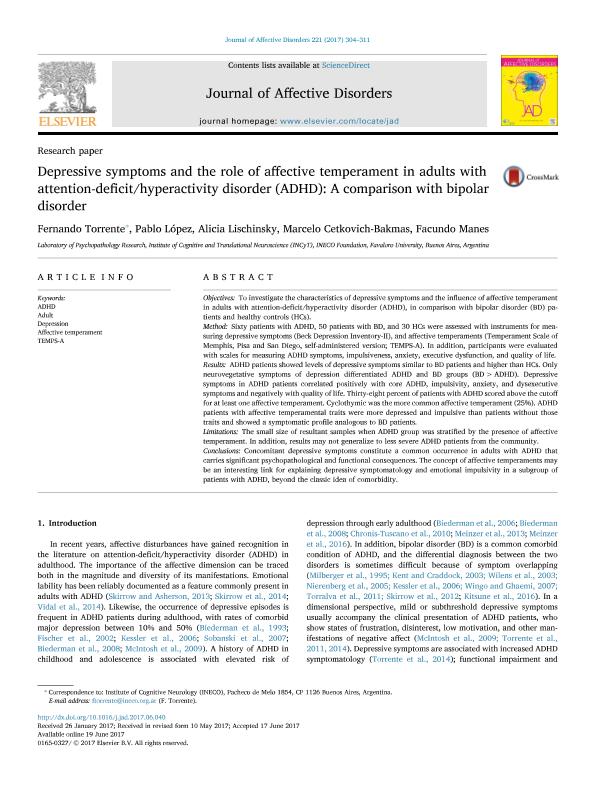Artículo
Depressive symptoms and the role of affective temperament in adults with attention-deficit/hyperactivity disorder (ADHD): A comparison with bipolar disorder
Torrente, Fernando; López, Pablo; Lischinsky, Alicia; Cetkovich Bakmas, Marcelo; Manes, Facundo Francisco

Fecha de publicación:
10/2017
Editorial:
Elsevier Science
Revista:
Journal of Affective Disorders
ISSN:
0165-0327
Idioma:
Inglés
Tipo de recurso:
Artículo publicado
Clasificación temática:
Resumen
Objectives: To investigate the characteristics of depressive symptoms and the influence of affective temperament in adults with attention-deficit/hyperactivity disorder (ADHD), in comparison with bipolar disorder (BD) patients and healthy controls (HCs). Method: Sixty patients with ADHD, 50 patients with BD, and 30 HCs were assessed with instruments for measuring depressive symptoms (Beck Depression Inventory-II), and affective temperaments (Temperament Scale of Memphis, Pisa and San Diego, self-administered version; TEMPS-A). In addition, participants were evaluated with scales for measuring ADHD symptoms, impulsiveness, anxiety, executive dysfunction, and quality of life. Results: ADHD patients showed levels of depressive symptoms similar to BD patients and higher than HCs. Only neurovegetative symptoms of depression differentiated ADHD and BD groups (BD > ADHD). Depressive symptoms in ADHD patients correlated positively with core ADHD, impulsivity, anxiety, and dysexecutive symptoms and negatively with quality of life. Thirty-eight percent of patients with ADHD scored above the cutoff for at least one affective temperament. Cyclothymic was the more common affective temperament (25%). ADHD patients with affective temperamental traits were more depressed and impulsive than patients without those traits and showed a symptomatic profile analogous to BD patients. Limitations: The small size of resultant samples when ADHD group was stratified by the presence of affective temperament. In addition, results may not generalize to less severe ADHD patients from the community. Conclusions: Concomitant depressive symptoms constitute a common occurrence in adults with ADHD that carries significant psychopathological and functional consequences. The concept of affective temperaments may be an interesting link for explaining depressive symptomatology and emotional impulsivity in a subgroup of patients with ADHD, beyond the classic idea of comorbidity.
Palabras clave:
Adhd
,
Adult
,
Depression
,
Affective Temperament
,
Temps-A
Archivos asociados
Licencia
Identificadores
Colecciones
Articulos(OCA HOUSSAY)
Articulos de OFICINA DE COORDINACION ADMINISTRATIVA HOUSSAY
Articulos de OFICINA DE COORDINACION ADMINISTRATIVA HOUSSAY
Citación
Torrente, Fernando; López, Pablo; Lischinsky, Alicia; Cetkovich Bakmas, Marcelo; Manes, Facundo Francisco; Depressive symptoms and the role of affective temperament in adults with attention-deficit/hyperactivity disorder (ADHD): A comparison with bipolar disorder; Elsevier Science; Journal of Affective Disorders; 221; 10-2017; 304-311
Compartir
Altmétricas



